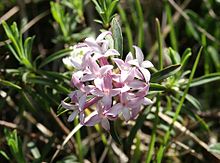Thymelaceae
| Thymelaeaceae | |
|---|---|
 |
|
| Daphne striata | |
| Scientific classification | |
| Kingdom: | Plantae |
| Clade: | Angiosperms |
| Clade: | Eudicots |
| Clade: | Rosids |
| Order: | Malvales |
| Family: |
Thymelaeaceae Juss. |
| Genera | |
|
See text |
|
See text
The Thymelaeaceae /ˌθɪmᵻliːˈeɪsiː/ are a cosmopolitan family of flowering plants composed of 50 genera (listed below) and 898 species. It was established in 1789 by Antoine Laurent de Jussieu.
The Thymelaeaceae are in the order Malvales. Except for a sister relationship with Tepuianthaceae, little is known for sure about their relationships with the other families in the order.
The family is more diverse in the southern hemisphere than in the northern, with a major concentrations of species in Africa and Australia. The genera are overwhelmingly African
The Thymelaeaceae are mostly trees and shrubs, with a few vines and herbaceous plants.
Several genera are of economic importance. Gonystylus (Ramin) is valued for its comparatively soft, easily-worked yellowish wood, but trade in all species in the genus are controlled by CITES. The bark of Edgeworthia and Wikstroemia is used as a component of paper, while Lagetta species are known as lacebark for their lacelike inner bark, which has been used to make clothing and utilitarian objects.
...
Wikipedia
